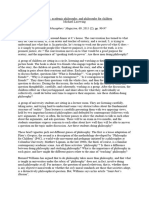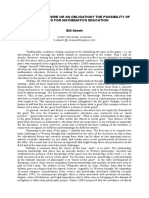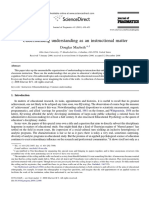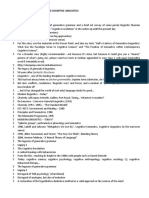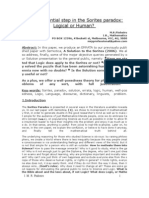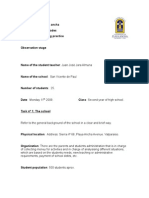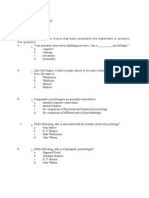3 Doc
3 Doc
Uploaded by
Sebastian GaonaCopyright:
Available Formats
3 Doc
3 Doc
Uploaded by
Sebastian GaonaOriginal Title
Copyright
Available Formats
Share this document
Did you find this document useful?
Is this content inappropriate?
Copyright:
Available Formats
3 Doc
3 Doc
Uploaded by
Sebastian GaonaCopyright:
Available Formats
In Defense of Pluralism:
An Essay in Trespass
Anindya Datta
As I read the "Call for Papers" for this second volume of the PSC Journal
on Writing Across the Curriculum, I feel I can claim that this essay belongs
to one of the suggested topics, namely, reflections on writing in the disciplines.
Five years ago, Sally Boland put me on the original committee called the
Task Force on Writing Across the Curriculum. I attended quite religiously
the first few meetings of the Task Force and even made some comments
from time to time as the ebb tides of adrenaline alternated with the flow
tides. Much of my comments was not very well focused, partly because
I did not, to start with, have an adequate idea of what writing across the
curriculum meant. Instinctively, however, I made one comment, that the
projects for writing had to be very different for the different disciplines,
that we must eschew Procrustean uniformity. Mary-Lou Hinman was
anxious to embark on the program and I was too ignorant to be of much
help. So, I initiated and accomplished my replacement by a person whose
certitude about the summum bonum of life allows me generally, albeit para
doxically, to preserve my own values at some safe distance.
The Task Force took off soon thereafter, and Mary-Lou's expostula
tions and remonstrations worked wonders with me. I was converted to
her cause. I participated in a well-attended and well-orchestrated work
shop, discovered some fascinating persons like Robert Hayden, and even
44 Writing Across the Curriculum, Vol. II, August 1990
DOI: 10.37514/WAC-J.1990.2.1.06
In Defense of Pluralism: An Essay in Trespass 6
did some writing assignments in the presence of a mixed gathering and
read them aloud. Shortly after that, I introduced "writing" (Journals,
Reports, etc.) in my courses as a regular and systematic feature. Things
were quite upbeat for some time and my original caveat, that the projects
of writing had to be very different for different disciplines, was about to
recede into oblivion, when suddenly came a rude awakening, the circum-
stances of which may be less important here than the question that was
raised in my mind afresh.
There is a fundamental, but unresolved, question of what makes good
teaching in a discipline which simultaneously enables the students to write
well in that discipline. In what follows, I shall attempt to provide a sketch
of some material, which veers around the problematique centered in this
fundamental, but unresolved, question. The limitation of space will not
permit me to do more.
Following Plato, a body of thought aspiring to resemble anything like
a philosophy of education must have, to a greater or less degree, an ethical
theory justifying a goal, a metaphysical theory supporting some of its
operational implications, and an epistemologicalframework explaining the
effectiveness of the teaching methods. Whatever the importance of it to
the modern mind, a secularized refrain in terms of Locke, namely, the
production and maintenance of a good society, defined as one in which
people find pleasure or happiness in the performance of duty (or, perhaps,
pursuit of life), gets inscribed on the mast of any modern-day educational
project. With metaphysics being held at bay, therefore, the epistemological
desideratum turns out to be the most contested ground in the modern
education system.
In Europe in the inter-war period, and in America until as late as the
early ~ O ' Seducational
, psychology fell under the domination of behavior-
ism, which sought to banish "mind" from all theory of education. It was
almost a non-arguable thesis, a pronunciamento, a policy statement, in the
name of objective methods. Fortunately, its spell was not too long-lived.
46 Writing Across The Curriculum (August 1990)
Today even among the behavioral revisioniststhe naive model of stimulus-
response is 110 longer in use. The organism, 0, as a black box, has been
inserted into the the S - O R model, and interactive feedbackshave appeared
in other models. The decisive break with behaviorism, however, came
first tentatively with the Gestalt psychologists and then more dramatically
with Piaget and his followers, and the linguistic theorist, Chomsky. Although
they offer very different perspectives on the nature of language and its
development, both Piaget and Chomsky are firmly opposed to the view
that human learning can be understood in terms of the reinforcement
connections between stimulus and response. The fact, however, remains
that the bane of behaviorism is still widespread, sometimes under different
rubrics, often incognito, in our education system.
Today even a freshman knows something about cognitive science, the
most active field in the theory of learning. Cognition is defined as the
"mental activities-how information enters the mind, how it is stored and
transformed, and how it is retrieved and used to perform such complex
activities as problem solving and reasoning. Thinking-the manipulation
and transformation of information inmemory-and language-a sequence
of words-are important aspects of cognition." (Santrock, Psychology, 2nd
edition, 1988). And how is language defined?-"a sequence of words that
involves infinite generativity, displacement, and rule systems. The rule
systems include phonology (sound system), morphology (meaning of
sounds we say and hear), syntax (how words are combined for acceptable
phrases and sentences), semantics (meaning of words and sentences), and
pragmatics (ability to engage in conversation effectively)."
So, language, it would seem, is a highly complex, but strictly rule-
governed, infinitude. And the newly emerging cognitive science seeks to
deal with the mediation of our knowledge of the external world by rep-
resentations, i.e., by mental objects that stand for things outside. It should
follow then that the mediation that connects mental representations in
different disciplines with their corresponding expressions through written
language will call for different kinds of facilitation for its efficiency. When
a mathematical discipline is at issue, there can be some fascinating, though
In Defense of Pluralism: An Essay in Trespass 47
unsuspected, features involved.
Philosophically speaking, cognitive science has very pronounced
Cartesian implications. The first such implication is that representations
have no necessary connection to the things they represent (often a
mathematician's stock-in-trade), known as representational skepticism.
The second implication is that it is possible to study the mind without
paying any attention to the reality it is supposed to represent (again often
a mathematician's stock-in-trade), known as methodological solipsism.
The third implication is that mind and body are two different kinds of
things, known as Cartesian dualism.
When a discipline (say, a mathematical discipline) is so characteris-
tically imbued with the first two implications, is it possible that the mapping
into language in such a case is best accomplished with a stricter adherence
to the structural formalism? At a lower level of abstraction, we may point
out that the cognitive science, as it is developing, is not free from very
thorny ontological and epistemological issues. When a mathematical
statistician deals with the concept of R2 (goodness of fit), is she dealing
with a propositional attitude or an example of qualia (feltexperience)? Is
it know that or know how? Is it procedural,declarative, or tacit knowledge?
One may know declaratively that a bicycle has two wheels and that one
must balance in order to ride it. One may not know how to ride a bicycle
on that basis. That requires prolonged problem-solving, which a learner
of mathematics must undertake (one can also learn to work out a mathe-
matical problem by rote, without learning). As Kohler showed, such
problem-solving needs insight, preceded by cool, quiet, prolonged pon-
dering.
Incidentally, take this questionable, but standard, claim. Integration
of ideas is supposed to be facilitated when there is a direct relation between
two ideas, and impeded when the relation must be inferred. A textbook
example is as follows:
48 Writing Across The Curriculum {August 1990)
Intergration facilitated:
Ed was given an alligator for his birthday. The al-
ligator was his favorite present.
Integration delayed :
Ed was given lots of things for his birthday. The
alligator was his favorite present.
(Weiten, Psychology, 1989)
Will it be invariably wrong to say that the second case, by creating
a momentary suspense and the appropriate atmosphere, makes a deeper
impression on the mind? The second one is cooler, quieter and more
effective. A mathematician may prefer the second one! It may be more
like a mathematical conclusion.
What I am driving at is that a discipline like mathematics, for example,
is a uniquely structured discipline, and human language, too, is a complex,
but highly structured, matter. It is possible that lectures in mathematics,
for example, at the college level should be more structured, not less; that
students may both learn mathematics and write about it better when a
cool, quiet, formal, non-emotional environment prevails in the classroom,
free from the excesses of noisy catechism. Such an environment may not
be created successfully overnight. We may need to teach our students of
the IAC (Introduction to the Academic Community) course what to expect
in some of the disciplines in particular, that neither being couch-potatoes
nor behaving hyperactively in the classroom is appropriate or beneficial,
that emotion can also be recollected in tranquility. Or, alternatively, it takes
the right emotion to control emotion. (Incidentally, one of my nephews
finished College Algebra at the age of eight or nine, helped non-intrusively
along by me. Later in life, he also rearned the National Science Foundation,
US. President’s Award for young investigators in science. It was all
accomplished in tranquility. He has written two books and many papers
since then. I am also finding my students writing their journals quite well
on the basis of my relatively structured lectures.)
Indeed, the connections between mathematics and language may be
In Defense of Pluralism: An Essay in T r e s p s 49
very deep and organic. In his Managua lectures, Chomsky speculated on
the mathematical abilityof human beings, considering that it was never
a factor in evolution. He thought the mathematical ability of human beings
might just be a reflection of some other ability. What is that ability?
Probably language. In a certain abstractsense, the structure of mathematics
is abstracted from the structure of language.
But that is a deeper matter which may never be resolved. In the
meantime, we may quite advisedly ponder over the followingremarks of
Bertrand Russell on the contrast between Behaviorism and Gestalt psy-
chology:
Animals studied by Americans rush about frantically,with
incredible dispIay of hustle and pep, and at last achieve
the desired solution by chance. Animals observed by
Germans sit still and think, and at last evolve the solution
out of their inner consciousness.
(quoted in Johnson-Laird, Computer and the Mind, 1988)
That should inhibit any unthinking zeal on the part of anybody for
regimenting our teachers' styles.
References
Chomsky, Noam: Language and Problems of Knowledge-Managua Lectures,
1988.
Eco, Urnberto (ed.): Meaning and Mental Representations, 1988.
Edwards, Paul (ed.): Encyclopedia of Philosophy, 1972.
Felman, Shoshana: Literature and Psychoanalysis, 1982.
Johnson-Laird,Philip: Computer and the Mind-An Introduction to Cognitive
Science, 1988.
50 Writing Across The Curriculum (August 7990)
Kohler, W.: The Mentality of Apes, 1925.
Schwyzer, Hubert: The Unity of Understanding-A Study in Kantian Problems,
1990.
Santrock, John: Psychology, 1988.
Stillings, Neil, et al.: Cognitive S c i e n c e - - A n Introduction 1989.
Vygotsky, Lev (ed. by Kozulin, Alex): Thought and Language, 1988.
Weiten, Wayne: Psychology, 1989.
Wood, David: How Children Think and Learn, 1988.
Born in Dhaka in BangladBh,Anindya Datta had his early education in Calcutta,
India. He did his graduate work at the University of Calcufta, Washington
University and Florida State University. He taught in the University System of
Florida for nine years before he came to the Plymouth State College in 1983, where
he teaches economics. Professor Datta was recently named the 1990 Distinguished
Teacher at Plymouth State College.
You might also like
- SPE 527 Module 1 Field Note-1Document4 pagesSPE 527 Module 1 Field Note-1ruth c.100% (2)
- Comparing Learning Theories Using The Dent-Read and Zukow-Goldring LearnerEnvironment MatrixDocument7 pagesComparing Learning Theories Using The Dent-Read and Zukow-Goldring LearnerEnvironment MatrixtracycwNo ratings yet
- Action Plan ScienceDocument3 pagesAction Plan ScienceSantisas ZaiNo ratings yet
- Rethinking Learning: Carl Bereiter Marlene ScardamaliaDocument23 pagesRethinking Learning: Carl Bereiter Marlene ScardamaliaJ. Félix Angulo RascoNo ratings yet
- Syllabus - Power and Pedagogy January 2016Document5 pagesSyllabus - Power and Pedagogy January 2016Anonymous B5xHxDDKWdNo ratings yet
- Philosophy of AiDocument9 pagesPhilosophy of Aisveta.bakulevaNo ratings yet
- Learning To See in Melanesia PDFDocument19 pagesLearning To See in Melanesia PDFjoaofontanelliNo ratings yet
- Some Remarks On Understanding in Mathematics - Sierpieska 1990Document13 pagesSome Remarks On Understanding in Mathematics - Sierpieska 1990ayandara.pesquisadoraNo ratings yet
- Learning To See in MelanesiaDocument19 pagesLearning To See in MelanesiaSonia LourençoNo ratings yet
- 05 - Yves ChevallardDocument44 pages05 - Yves ChevallardMelvin P. CarumbaNo ratings yet
- TPM Philosophy Academic Philosophy and p4cDocument6 pagesTPM Philosophy Academic Philosophy and p4cGupi PalNo ratings yet
- Implicit Learning and Tacit Knowledge: An Essay On The Cognitive UnconsciousDocument21 pagesImplicit Learning and Tacit Knowledge: An Essay On The Cognitive UnconsciousAmit MukerjeeNo ratings yet
- An Introduction to Logic and Scientific MethodFrom EverandAn Introduction to Logic and Scientific MethodRating: 3 out of 5 stars3/5 (2)
- Learning Logic: Critical Thinking With Intuitive NotationFrom EverandLearning Logic: Critical Thinking With Intuitive NotationRating: 4.5 out of 5 stars4.5/5 (3)
- Ability Disability and The Question of PhilosophyDocument8 pagesAbility Disability and The Question of PhilosophyJorge OrozcoNo ratings yet
- SectbyfnDocument18 pagesSectbyfnO Homem de AçoNo ratings yet
- The Contradictions in The Constructivist DiscourseDocument26 pagesThe Contradictions in The Constructivist DiscoursesiepaNo ratings yet
- Steps Towards A New EpistemologyDocument10 pagesSteps Towards A New EpistemologyAdy AkbarNo ratings yet
- Modularity of Mind Jerry A FodorDocument154 pagesModularity of Mind Jerry A FodorSedat Can100% (2)
- Freudenthal Didactical Phenomenology of Mathematical Structures1983 PDFDocument606 pagesFreudenthal Didactical Phenomenology of Mathematical Structures1983 PDFChristian Jonathan Angel Rueda100% (1)
- What Do You Mean by 'Collaborative Learning'?: Chapter 1 (Introduction)Document15 pagesWhat Do You Mean by 'Collaborative Learning'?: Chapter 1 (Introduction)Anis SofeaNo ratings yet
- Merleau Ponty - Basic WritingsDocument5 pagesMerleau Ponty - Basic WritingsMelanieShiNo ratings yet
- Butter and Bread, An InterviewDocument17 pagesButter and Bread, An InterviewTamara StojanovicNo ratings yet
- (Perspectives in Social Psychology) Arie W. Kruglanski (Auth.) - Lay Epistemics and Human Knowledge - Cognitive and Motivational Bases-Springer US (1989)Document286 pages(Perspectives in Social Psychology) Arie W. Kruglanski (Auth.) - Lay Epistemics and Human Knowledge - Cognitive and Motivational Bases-Springer US (1989)Rodrigo Seixas100% (1)
- Visual Tools For Teaching Propositional LogicDocument2 pagesVisual Tools For Teaching Propositional LogicDenisse AcostaNo ratings yet
- Theories of LearningDocument13 pagesTheories of Learningbasran87No ratings yet
- John Marenbon - The SelfDocument21 pagesJohn Marenbon - The SelfErnesto Fuentes PadgettNo ratings yet
- Nolan Cont Met ADocument23 pagesNolan Cont Met ABeto CarreñoNo ratings yet
- Atweh - Is The Good A DesireDocument10 pagesAtweh - Is The Good A DesireBuddy OverthinkerNo ratings yet
- Understanding Understanding As An Instructional Mat 2011 Journal of PragmatiDocument14 pagesUnderstanding Understanding As An Instructional Mat 2011 Journal of PragmatiEugenia CabralNo ratings yet
- What Is Inaugural Professorial LectureDocument19 pagesWhat Is Inaugural Professorial LectureanakothmanNo ratings yet
- Foundations of Problem-Based Learning: Some Explanatory NotesDocument11 pagesFoundations of Problem-Based Learning: Some Explanatory NotesDevin KwanNo ratings yet
- 1MemoryConcepts07 1Document11 pages1MemoryConcepts07 1kahainNo ratings yet
- Learning Networks and Connective KnowledgeDocument31 pagesLearning Networks and Connective KnowledgeDickyHalinWijanaAshidiqNo ratings yet
- Contemporary Theories in Cognitive Linguistics Power PointDocument5 pagesContemporary Theories in Cognitive Linguistics Power PointMajaNo ratings yet
- 1 Lawn - Introduction To Methodology PDFDocument12 pages1 Lawn - Introduction To Methodology PDFnikite nirmalaNo ratings yet
- Philosophy SS Module Descriptions 16 17Document8 pagesPhilosophy SS Module Descriptions 16 17Mary Ann PateñoNo ratings yet
- The Logic of LearningDocument15 pagesThe Logic of LearningMayran Orozco CornejoNo ratings yet
- Philosophy of Learning - CleanedDocument7 pagesPhilosophy of Learning - CleanedAnela RamosNo ratings yet
- The Inferential Step in The Sorites Paradox: Logical or Human?Document61 pagesThe Inferential Step in The Sorites Paradox: Logical or Human?illmrpinheiroNo ratings yet
- Ranciere in Education 9Document16 pagesRanciere in Education 9nk8553855No ratings yet
- 1thesis Statement AnthroDocument3 pages1thesis Statement AnthroanaspirantNo ratings yet
- Sources of Knowledge For Theories of ReadingDocument19 pagesSources of Knowledge For Theories of ReadingYvonne HaynoNo ratings yet
- Journal of Philosophy, IncDocument13 pagesJournal of Philosophy, Incsp.d25d25No ratings yet
- The Dimensional Philosopher's Toolkit: Or, the Essential Criticism; the Dimensional Encyclopedia, First VolumeFrom EverandThe Dimensional Philosopher's Toolkit: Or, the Essential Criticism; the Dimensional Encyclopedia, First VolumeRating: 5 out of 5 stars5/5 (1)
- Oedipus Constructed Preliminaries - A Theory of AssimilationDocument2 pagesOedipus Constructed Preliminaries - A Theory of AssimilationPedro Roa OrtegaNo ratings yet
- Anex2001 Winter Mccarthy PDFDocument3 pagesAnex2001 Winter Mccarthy PDFPradeep ThawaniNo ratings yet
- fshowDocument12 pagesfshowjhaceyuzovchiNo ratings yet
- Digital Paradoxes in Learning TheoriesDocument5 pagesDigital Paradoxes in Learning TheoriesmarialetiziaNo ratings yet
- D'Andrade 2005 Some Methods For Studying Cultural Cognitive Structures PDFDocument22 pagesD'Andrade 2005 Some Methods For Studying Cultural Cognitive Structures PDFarchaeodogNo ratings yet
- The Inferential Step in The Sorites Paradox: Logical or Human?Document32 pagesThe Inferential Step in The Sorites Paradox: Logical or Human?illmrpinheiroNo ratings yet
- Lesson 10 - HandoutDocument4 pagesLesson 10 - HandoutLu TengNo ratings yet
- Guided Tour: . Structuring The ProjectDocument352 pagesGuided Tour: . Structuring The ProjectGabriel IstratiiNo ratings yet
- Book Review Philosophy of Education: An Introduction. by T. W. Moore. Pp. Xi, 142. London: Routledge and Kegan Paul, 1982Document21 pagesBook Review Philosophy of Education: An Introduction. by T. W. Moore. Pp. Xi, 142. London: Routledge and Kegan Paul, 1982gmarico5176No ratings yet
- Cultural Anthropology 4Document13 pagesCultural Anthropology 4giorgiandrettaNo ratings yet
- Challenges of Critical ThinkingDocument16 pagesChallenges of Critical ThinkingZander PangNo ratings yet
- What Is Philosophy of Education-1Document8 pagesWhat Is Philosophy of Education-1faisalabdullah030No ratings yet
- LUHMANN SCHORR Problems of Reflection in System of EducationDocument207 pagesLUHMANN SCHORR Problems of Reflection in System of Educationnicolientur100% (2)
- PHD Thesis EpistemologyDocument4 pagesPHD Thesis Epistemologyfjn786xp100% (2)
- Louise Wetherbee Phelps - Composition As A Human Science - Contributions To The Self-Understanding of A Discipline-Oxford University Press (1988)Document287 pagesLouise Wetherbee Phelps - Composition As A Human Science - Contributions To The Self-Understanding of A Discipline-Oxford University Press (1988)MaxirauxGDNo ratings yet
- Chapter 1 Social Psy NotesDocument8 pagesChapter 1 Social Psy NotesNigar HuseynovaNo ratings yet
- Juan Jara Assignment 3Document5 pagesJuan Jara Assignment 3jossx87No ratings yet
- Chapter 13 - Goal SettingDocument43 pagesChapter 13 - Goal SettingHANAH LORAINE LAUREANo ratings yet
- Career Guidance Program Monitoring Form San RoqueDocument16 pagesCareer Guidance Program Monitoring Form San Roquejovie nombradoNo ratings yet
- Final Position Paper - WPS OfficeDocument5 pagesFinal Position Paper - WPS OfficeAngeline GuillasNo ratings yet
- A. Classroom Preparation/ Management:: John Jennis M. Trinidad Teacher School Principal IIDocument4 pagesA. Classroom Preparation/ Management:: John Jennis M. Trinidad Teacher School Principal IIEchavez PeterNo ratings yet
- Lesson Plan 3 MathDocument5 pagesLesson Plan 3 Mathapi-382172511No ratings yet
- My Philosophy of Education 2Document10 pagesMy Philosophy of Education 2api-253718625100% (1)
- Resume OnlyDocument2 pagesResume Onlyapi-384688622No ratings yet
- Micro Teaching Reinforcement-1Document23 pagesMicro Teaching Reinforcement-1Delvi AnaNo ratings yet
- Behaviorism TheoryDocument3 pagesBehaviorism Theorysalma ristantiNo ratings yet
- Kumaks Fish LessonDocument2 pagesKumaks Fish Lessonapi-365479423No ratings yet
- Conditioning ProjectDocument2 pagesConditioning Projectapi-338500937No ratings yet
- Interview Questionnaire For Senior Assistant Teacher in ManagementDocument2 pagesInterview Questionnaire For Senior Assistant Teacher in ManagementTHANALECHMI A/P MUNIANDI MoeNo ratings yet
- Psychology Theories SummaryDocument4 pagesPsychology Theories SummaryflashfixprocdNo ratings yet
- Schools of Psychology Practice MC Questions-1Document15 pagesSchools of Psychology Practice MC Questions-1Alan Wilson100% (2)
- 1 Learning ResourcesDocument30 pages1 Learning Resourcessinsin100% (1)
- TOPIC 5 Support For Learner ParticipationDocument3 pagesTOPIC 5 Support For Learner ParticipationGEMMA ROSE SELANOBA SANSON100% (1)
- Abraham L. Cuevas: Public ServantDocument43 pagesAbraham L. Cuevas: Public ServantFernan CapistranoNo ratings yet
- psychology:ItKrumbolz 'S Social Learning Theory of Career Development (SLTCD)Document3 pagespsychology:ItKrumbolz 'S Social Learning Theory of Career Development (SLTCD)opulentgaze100% (1)
- Chapter 12 SummaryDocument3 pagesChapter 12 SummarymualtukNo ratings yet
- Group Presentation On Albert BanduraDocument17 pagesGroup Presentation On Albert BanduraAllyson Joshyboo GreenNo ratings yet
- Lecture 1 PDFDocument17 pagesLecture 1 PDFIlmira ArtikbayevaNo ratings yet
- Interventions For Classroom DisruptionDocument54 pagesInterventions For Classroom Disruptionnosunar100% (1)
- Bouton, Context, Time, and Memory Retrieval in The Interference Paradigms of Pavlovian LearningDocument20 pagesBouton, Context, Time, and Memory Retrieval in The Interference Paradigms of Pavlovian Learningpsi.cortizsaenzNo ratings yet
- Collaborative and Cooperative LearningDocument6 pagesCollaborative and Cooperative Learningaparna adhyaNo ratings yet
- Facilitating Learning - Chapter 6 AssessmentDocument1 pageFacilitating Learning - Chapter 6 Assessmentrejesh50% (2)











